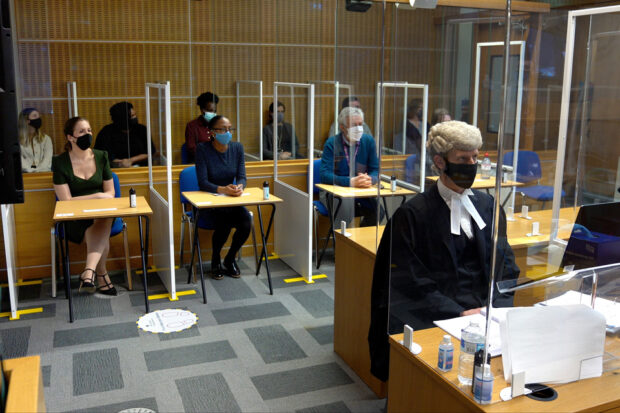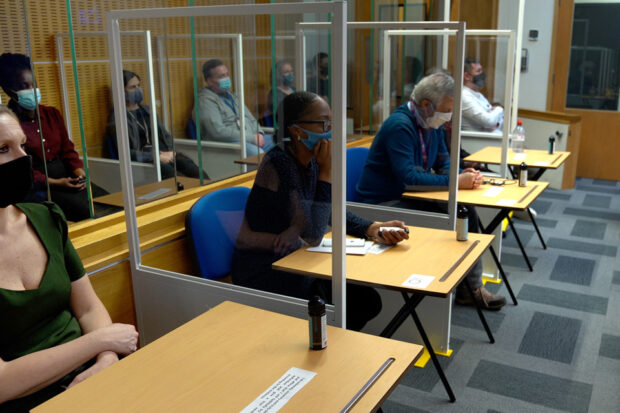When we think of workplaces adapting during the pandemic, we may think of restaurants swapping their fine-dining offer to deliver food parcels to shielding neighbours, or NHS staff adapting hospital facilities to support increased demand. But many other workplaces had to innovate too.
In the criminal courts in England and Wales, we need to ensure justice continues to provide a vital, safe service to those who need it most. Any innovation also has to address the number of outstanding criminal court cases so the justice system can be accessed swiftly when needed – whether to resolve a business dispute, protect a child at risk, or bring an offender to justice.
Nightingale courtrooms are one successful weapon in our fight back against the effects of the pandemic, alongside other measures, such as the use of remote technology. But these measures alone can’t tackle the huge challenges in returning our courts to dealing with their previous levels of work. With social distancing and safety measures rightly in place to protect all court users, few courts are operating at their pre-COVID capacity levels.

Finding innovative solutions
At Hendon Magistrates’ Court, in the London Borough of Barnet, available space is providing vital extra support to nearby Wood Green Crown Court. The building has been transformed to host jury trials for the first time which, given the numbers of people involved, requires a larger space.
A ten-courtroom centre pre-COVID, Wood Green is currently only able to sit four courtrooms for jury trials. Its other courtrooms are being used as an extra public gallery, jury retiree rooms and for administrative hearings. So, despite working with all the facilities currently available, Wood Green is unable to perform at its previous operational levels.
Judge Noel Lucas QC, resident judge at Wood Green and now in temporary chambers in Hendon, welcomed the new facilities, after more than six months of planning:
“These additional courtrooms will enable us to virtually double our trial capacity. We may not be able to stem the tide of our backlog increasing, but we will very significantly slow that increase down.
“Justice delayed is justice denied. I know it's a well-worn expression, but it means something. It means that those who have been victims of crime are entitled to have their allegations resolved swiftly and fairly and those who are accused of a crime are also entitled to have their cases resolved both swiftly and fairly. I feel very strongly that we must do everything in our power to increase our trial capacity for those reasons.”
Overcoming challenges together
Hendon will provide its support to Wood Green for the next 12 months, but it’s already had an impact. Mahesh Patel, the court’s operations manager, explains what the team have achieved so far:
“It’s working really well. We’ve dealt with 60 trials since opening on 8 April 2021 and are running at 100% capacity.
“It’s a collaborative effort – our staff have been amazing and are proud to be able to do their bit to help get the justice system back on track.”
One of the biggest barriers to adapting existing facilities to accommodate jury trials is often the custody provision. The magistrates’ court at Hendon already had its own cells, meaning two of the courts can conduct trials where the defendant is in custody and a third room is set aside for bail cases.
Accommodating 12 jurors in courtrooms that don't usually have a jury is another significant challenge. Jurors at the newly-configured Hendon court will find themselves seated in and around what used to be the public gallery.
Staff overcame these challenges by working together and with other court users. They hosted mock trials to iron out any issues before live trials could begin.

Feedback
Richard Benyon from Red Lion Chambers, who participated in a full mock trial, commented:
“I was a marshal, coming in with Judge Lucas to see things from the bench and really to pick up those items that it’s very difficult to gauge unless you actually see it in front of you. It's [been] a really constructive day today.”
Participants fed back on sight lines, including identifying the best vantage points for jurors or the defendant. They also advised that barristers could turn their backs to the judge to speak directly to the jury.
Joanne Towens, HMCTS Cluster Manager, added her view of the collaborative effort:
“Opening the additional ‘Nightingale’ courts and repurposing existing courtrooms at Hendon Magistrates’ Court has been challenging but very rewarding for all. The additional capacity offers us the opportunity to list more cases, which helps all court users.
“Feedback from court users so far is positive. They like the fact that HMCTS is thinking outside the box, that we are considering all options, including conference centres and hotels.
“Involving court users from an early stage in these projects has helped to make them a massive success. We are extremely proud of all we have achieved so far.”

Leave a comment